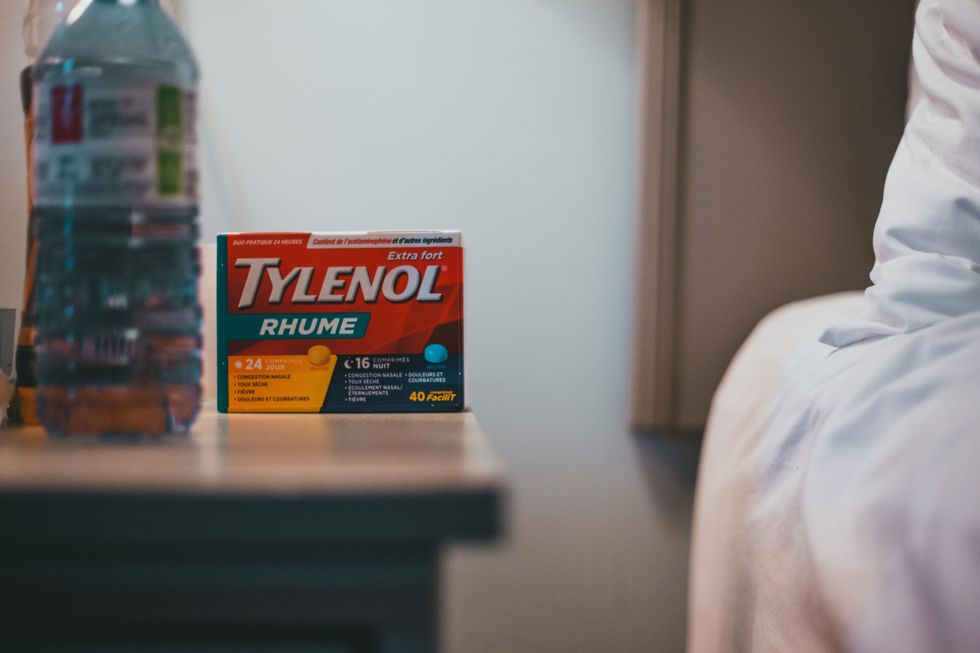Economy
25 January 2023
Post-it, Sharpie makers announce layoffs
Here's the latest on consumer goods from 3M, Newell Brands, Johnson & Johnson and Kimberly-Clark.

Photo by Kelly Sikkema on Unsplash
Here's the latest on consumer goods from 3M, Newell Brands, Johnson & Johnson and Kimberly-Clark.

Consumer goods companies are operating in a volatile environment, as they see a pullback in consumer demand while continuing to face inflationary pressures from the supply side.
At the same time, some of the largest companies in the industry are moving forward with plans on structural shifts and innovation in 2023.
Here’s what we learned from this week’s earnings calls and updates from 3M, Newell Brands, Johnson & Johnson and Kimberly-Clark.
 Photo by charlesdeluvio on Unsplash
Photo by charlesdeluvio on Unsplash3M is laying off 2,500 employees in manufacturing as it adjusts for an economic forecast that is expected to continue to create a difficult consumer environment in 2023.
The maker of Post-It notes and Scotch tape is seeing pullback among consumers. It reported Tuesday that organic sales for the fourth quarter of 2022 were down 5.7% year-over-year, while adjusted earnings per share of $2.28 came in below the $2.45 of Q4 2021.
Consumers cut back on discretionary spending, and retailers reduced inventories, company leaders said. The U.S market showed particular weakness on sales, and was down high-single-digits.
“The slower-than-expected growth was due to rapid declines in consumer-facing markets, such as consumer electronics and retail, a dynamic that accelerated in December, as consumers sharply cut discretionary spending and retailers adjusted inventory levels,” CEO Mike Roman said. “We also saw a significant slowing in China due to COVID-related disruptions, along with moderating demand across industrial markets.”
January is also off to a slow start due to the same issues that hampered the end of 2022, Roman said.
By 2025, the company is also planning to exit the manufacturing of PFAS, known commonly as forever chemicals, that are used in consumer products like non-stick frying pans, waterproof gear and cosmetics.
 Photo by Hello I'm Nik on Unsplash
Photo by Hello I'm Nik on UnsplashNewell Brands, the maker of Sharpie, Rubbermaid and Coleman, is set to lay off 13% of its workforce as part of a broad restructuring.
CEO Ravi Saligram announced that the layoffs are part of a plan called Project Phoenix that is designed to “further reduce complexity, streamline our operating model and drive operational efficiencies.”
“These actions are a continuation of the simplification agenda that we have driven over the last four years and in response to the difficult macro-economic environment,” Saligram wrote. “Project Phoenix will unlock savings for the company, while making us a more nimble and agile organization and well-positioned for long term, profitable and sustainable growth.”
Newell Brands is a lesser-known name to the general public but is influential, and has brands across home, outdoor and office categories. The company had 32,000 employees as of Dec. 31, 2022, according to its most recent annual report.
With the restructuring, Newell Brands said it is moving from seven business segments to three. These include learning and development, home and commercial and outdoor and recreation. It is also adopting a unified go-to-market strategy called “One Newell” for Walmart, Target and Costco. Newell is also moving to a single global supply chain organization, led by chief supply chain officer Dennis Senovich.
With the changes, appliance and cookware unit CEO Chris Robins will leave the company.
The company is also closing corporate offices in Boca Raton, Florida, and South Deerfield, Massachusetts.
In the third quarter of 2022, Newell reported a 19.2% decline in net sales from the prior year. At the time, Saligram said that sales “decelerated” in the third quarter after a strong first half of the year, “reflecting a tough operating environment as many retailers rightsized their inventory positions, inflationary pressure on both the consumer and our business, as well as the impact of a stronger dollar.”
 Photo by Erik Mclean on Unsplash
Photo by Erik Mclean on UnsplashThe consumer health division of Johnson & Johnson delivered growth in the fourth quarter as the company prepares to separate the business that makes Tylenol, Neutrogena, Listerine and Band-Aid.
U.S. sales in the company’s consumer category increased 11% over the fourth quarter of 2021, while global sales increased 1% globally. Results were driven by price increases, and increased over-the-counter sales during an active cold and flu season that saw elevated rates of respiratory infections. Neutrogena also grew significantly, contributing 5% to the company’s skin health and beauty segment.
Margins also improved from 18.6% to 22%, driven by moderating marketing spend from earlier in the year and supply chain efficiencies.
The strong quarter comes as the consumer health business is set to be spun out of J&J and get a new name: Kenvue. Leaders said the move is on track to take place in 2023. The consumer division is already operating as a “company within a company,” said CEO Joaquin Duato. Earlier in January, J&J filed paperwork with the SEC to provide the option for Kenvue to pursue an IPO at the time of the separation, if it so chooses.
J&J joins GSK and 3M among consumer giants that are spinning out health businesses into standalone companies in recent years.
 Photo by Kelly Sikkema on Unsplash
Photo by Kelly Sikkema on UnsplashKimberly-Clark sees demand holding up for household staples in personal care. The maker of Kleenex and Huggies said Wednesday that organic sales grew 5% in the fourth quarter of 2022, and 7% growth for 2022 as a whole.
For 2023, the company expects more modest net sales growth of 2-4%. Operating profit is expected to rise in the mid-to-high single digits when compared to adjusted operating profit in 2022.
CEO Mike Hsu said the company sees demand and elasticities “holding up” as the company has continued to raise prices as it faces higher supply costs. There was some inflationary impact on the number of units sold beginning to show up more in the fourth quarter. Prices rose 10%, and volumes were down 7%.
“I do think there is more pressure on the consumer, but I still think the category remains very resilient because of the essential nature of the category,” Hsu said.
Nevertheless, executives want to push ahead with innovation. In the next year, the company will spend more on marketing, research and other general expenses.
In particular, the company plans to increase advertising spending more in line with 2020 levels after a decrease over the last two years. This will include an investment in China.
This will be particularly evident in the second half of the year, when the company launches a new initiative that Hsu said will “blow your mind when you see it.” After apologizing for using such language on an earnings call, Hsu hinted that “We’ll do miraculous things with poop.“ Later, Hsu offered analysts a tour of the company’s “war room on poop superiority.”
“That’s kind of the business we’re in,” Hsu said. Such innovation is par for the course for a CEO who oversees diaper and toilet paper brands.
Campbell Soup Company CEO Mark Clouse offered thoughts on messaging amid inflationary shifts in consumer behavior.
After months of elevated inflation and interest rate hikes that have the potential to cool demand, consumers are showing more signs of shifting behavior.
It’s showing up in retail sales data, but there’s also evidence in the observations of the brands responsible for grocery store staples.
The latest example came this week from Campbell Soup Company. CEO Mark Clouse told analysts that the consumer continues to be “resilient” despite continued price increases on food, but found that “consumers are beginning to feel that pressure” as time goes on.
This shows up in the categories they are buying. Overall, Clouse said Campbell sees a shift toward shelf-stable items, and away from more expensive prepared foods.
There is also change in when they make purchases. People are buying more at the beginning of the month. That’s because they are stretching paychecks as long as possible.
These shifts change how the company is communicating with consumers.
Clouse said the changes in behavior are an opportunity to “focus on value within our messaging without necessarily having to chase pricing all the way down.”
“No question that it's important that we protect affordability and that we make that relevant in the categories that we're in," Clouse said. "But I also think there's a lot of ways to frame value in different ways, right?”
A meal cooked with condensed soup may be cheaper than picking up a frozen item or ordering out. Consumers just need a reminder. Even within Campbell’s own portfolio, the company can elevate brands that have more value now, even if they may not always get the limelight.
The open question is whether the shift in behavior will begin to show up in the results of the companies that have raised prices. Campbell’s overall net sales grew 5% for the quarter ended April 30, while gross profit margins held steady around 30%. But the category-level results were more uneven. U.S. soup sales declined 11%, though the company said that was owed to comparisons with the quarter when supply chains reopened a year ago and expressed confidence that the category is seeing a longer-term resurgence as more people cook at home following the pandemic. Snacks, which includes Goldfish and Pepperidge Farm, were up 12% And while net sales increased overall, the amount of products people are buying is declining. Volumes were down 7%.
These are trends happening across the grocery store. Campbell is continuing to compete. It is leading with iconic brands, and a host of different ways to consume them. It is following that up with innovation that makes the products stand out. Then, it is driving home messaging that shows consumers how to fit the products into their lives, and even their tightening spending plans.
Campbell Soup is more than 150 years old, and has seen plenty of difficult economic environments. It is also a different business today, and will continue to evolve. At the end of the day, continued execution is what’s required.
“If it's good food, people are going to buy it, especially if it's a great value,” Clouse said.